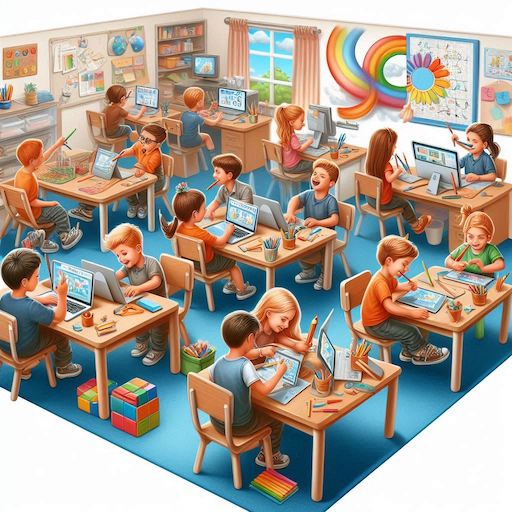Addressing the Pandemic's Impact on Young Learners Through the Innovative AI powered Kinems Solution
 The COVID-19 pandemic has had profound effects on education, particularly for the youngest students who are now showing signs of being academically and developmentally behind. According to a recent article by the The New York Times: "The Pandemic’s Babies and Toddlers Are Struggling in School", many young children struggle with age-appropriate skills, and older children have lost significant ground in math and reading, with boys being more affected than girls. Teachers report behavioral problems, speech delays, and difficulties with emotional regulation among their students, exacerbated by factors like parental stress, reduced social interaction, lower preschool attendance, and increased screen time.
The COVID-19 pandemic has had profound effects on education, particularly for the youngest students who are now showing signs of being academically and developmentally behind. According to a recent article by the The New York Times: "The Pandemic’s Babies and Toddlers Are Struggling in School", many young children struggle with age-appropriate skills, and older children have lost significant ground in math and reading, with boys being more affected than girls. Teachers report behavioral problems, speech delays, and difficulties with emotional regulation among their students, exacerbated by factors like parental stress, reduced social interaction, lower preschool attendance, and increased screen time.
The article highlights that these children represent a "pandemic tsunami" for the American education system.
However, there is hope.
Key Takeaways:
- Impact on Young Students: Many school-age children after the pandemic lockdown are showing signs of being academically and developmentally behind.
- These entering students struggle with their age-appropriate skills.
- Older children lost significant ground in math and reading during school closures.
- Boys seem to be more affected than girls in this age group.
- Challenges in Schools: Teachers report behavioral problems, speech delays, and emotional regulation issues among young students.
- Factors like parental stress, reduced exposure to people, lower preschool attendance, and increased screen time have contributed to the challenges this generation of children now entering school will face.
However, there is hope. Experts believe that with early intervention and support, children can catch up.
To address these challenges, innovative ΑΙ educational solutions like the Kinems learning gaming platform offer a promising path. Kinems combines playfulness with targeted, personalized learning using a multimodal and multisensory game-based approach. This method supports young students' holistic development and growth by:
- Multisensory Learning: The Kinems platform and activities utilizing AI to create dynamic, immersive environments where children actively engage with virtual elements. This caters to different learning styles through auditory, visual and kinesthetic activities.
- Customization for Diverse Learners: Tools are available for teachers to easily customize learning resources based on academic standards, students levels and their individual needs and goals. This allows the seamless integration of activities into existing curricula to implement required standards.
- Enhancing Teaching Strategies: Supporting collaborative approaches where teachers orchestrate interactive and stimulating learning experiences. Turn on the program and play the games!
- Progress Monitoring and Real-Time Reporting: Teachers can effectively track and monitor student growth in motor and learning skills, enabling the design of personalized learning sessions targeting specific goals in Mathematics, ELA, or cognitive functions. Each session is captured and teachers can pdf and email or print progress reports over time to share with parents, clinicians and administrators.
- Making Learning Fun and Joyful: Hearing children laughing as they play games while learning is the best path to mastery. Game based learning research has demonstrated the motivational aspects it provides for education. When a child seeks to master a game, collect points, challenge their speed and accuracy they actually enjoy computation practice, perfecting grammar, reading comprehension and executive functions.
In summary, AI-powered tools like Kinems are invaluable for educators facing the post-pandemic challenges in early education. By embracing these technologies, teachers can create engaging, personalized, and effective learning environments that help bridge the developmental gaps exacerbated by the pandemic.
For more detailed insights and solutions, read the full articles on the impact of the pandemic on young learners from The New York Times and the importance of AI in education from CNBC.